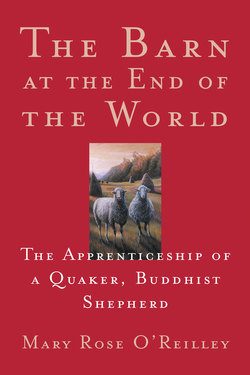Читать книгу The Barn at the End of the World - Mary Rose O'Reilley - Страница 12
На сайте Литреса книга снята с продажи.
ОглавлениеSurrender
RESTLESS, I GO DOWN to the barn and attempt to dissect the concept of “peace…”
As I help Anna clean out the lambing pens, my skirt pinned up under an apron, mind and body begin to alter their usual relation to each other. I cannot think about “peace”; I cannot think about anything. This is a natural consequence of doing the kind of repetitive work called “mindless” by those who disdain it. Yet my mind is not so much absent as still. It’s not at its usual station in my head, but diffused throughout my body. Or, slid beyond the body, even, to encompass all that’s going on in the barn.
My hands are efficiently chucking down clean straw and, as I watch the ewe position herself for the scrambling lamb, my nipples contract in the reflex of a nursing mother. If I were not well past the childbearing years, my blouse might be soaked with milk. This is a passing, negligible sensation, a product merely of being present. I do not stop working to examine it. A casual dissolution of boundaries body-to-body happens when you work in the barn. With animals, it’s safe, and pertinent, to have no edges. It helps you to manage sheep and them to manage you. If I bother to retrieve my mind, I find it shared out among the ewes, who have made good time with it.
There is deep rest in this loss of self. Peace, which implies stillness, and ecstasy: every hair in motion. Thus lovers and people who read each other’s poems breathe the other, if they love or read well. Thus music. If you play the fiddle, no matter how badly, and you go to hear a great violinist—as last month I went to a concert of Isaac Stern’s—you hear the performance in the hollows of your own body (or has it ceased to be your body?)—that lilt of Stern’s at the tip of the bow is in your fingers. If I am flowing in this moment through one pride of skin and not another, it’s accident. And I test the limits of this bubble as once I tested the limits of the womb.
When you go down to the lambing pens you can tell from the doorway if something’s gone wrong: a ewe whose lamb is dead will have slipped back in the fold with her sisters. Most animals are pragmatic and have little patience with weakness—perhaps you have seen how a mother cat will favor her strong, aggressive kitten and paw aside the runts. Last night Anna struggled till 3 A.M. to save a lamb too short to reach the teats, tubing colostrum into her stomach, then bottle feeding every two hours. This morning the lamb came to me with her tail shaking, a sign of health, and took two ounces of formula. In the barnyard, I try to volunteer a shift with Anna, sparing her the night work since I’m fresher.
But—“I don’t think we will have to stay up tonight,” she says. Her tone is the oblique and respectful one used by my dad and his pilot friends when refusing to pronounce the word crash. Over her shoulder I see four ewes in the fold where three had been standing.
We put the dead lamb in a plastic bucket, later to bury. “Poor little mauser,” says Anna. “Still, she had some good hours.”
Philosophers make distinctions between varieties of dispossession; it cannot be the same, they say, to surrender to love, to music, to animal creation, and to prayer. (But stand with someone you love, palm to palm, eyes closed, and sing a perfect fourth…) Since I experience these slips of consciousness as similar, I can only speak from what I know. Intensity of presence is the common element, though in the next moment one could say, intensity of absence.
Without presence, the violence would be unthinkable: of God, of Zen practice, of lovemaking, and certainly of the farm. How disquieting to fight so hard for the life of a lamb and tomorrow meet its cousin tucked up in the crockpot. Namaste: I honor the god in you.
Disquieting, anyway.
